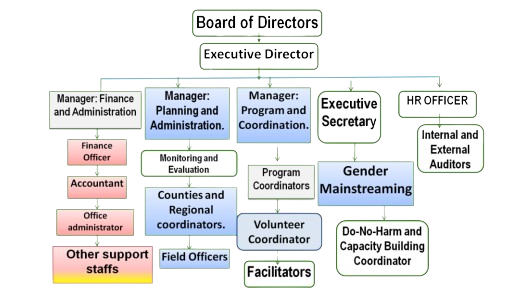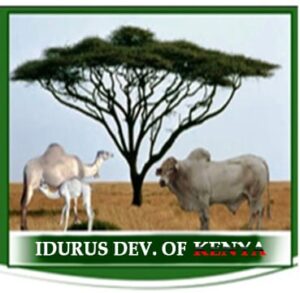Email: info@idurusdevkenya.org
History
IDURUS Development is a non-governmental, not for profit making, secular, humanitarian and development organization. It was established in 2008 as CBOin Ethiopia by a group of community professionals who have an intimate knowledge of the precarious livelihood conditions pastoralist and agropastoralist communities are increasingly being immersed in and who are concerned about the situation. It is re-registered in 2018 as a local NGO with the Ethiopian Agency for CSOs as per the proclamation 261/2009 (with registration No 3523). Later IDURUS Development was registered with Kenya NGO Condition board in 2014 as local NGO to officiate its operation in Kenya. IDURUS NGO aspires to help vulnerable segments of the society, tackle the object poverty that is prevalent among pastoralist communities, and that resulted from and/or aggravated by, man-made and natural disasters. It subscribes to the bottomup/participatory, people-centered development approach.
Vision, Mission, and Core Values
Vision: Our vision is a Horn of Africa where human rights are respected, democratic culture flourishes and economic development and peace are achievable. The vision envisages a region in which citizens live in democracy, shared and equitable prosperity, and conflicts are resolved peacefully and justly.
Mission: To nurture and promote peace, human rights, democratic culture and values, as well as, sustainable economic development. IDURUS strives to fulfill its mission in general in the Horn, and particularly in Kenya and Ethiopia through a combination of research, dialogue, advocacy and networking.
Core Values: The core principles and values of IDURUS guiding the individual and collective
responsibility are:
- Promotion of justice and fairness
- Protection of the fundamental rights of people
- Promotion of peaceful coexistence
- Advocating accountability and transparency
- Adherence to the principle of equality and equity
- Supporting sustainable economic development
Objectives
Overall Objective
The overall objective of IDURUS development is to improve the living conditions of pastoralists and agro-pastoralists by building their resilience to withstand shocks, supporting them to practice participatory management of their natural resources, and ensure household food security.
Specific objectives
- Building capacity of communities
- Justice, Democracy and Human Right
- Peace and Security
- Promoting participatory natural resources management (NRM)
- Contributing towards enhancement of household food security
- Identifying and promoting improved ways of livestock herding
- Promoting organic farming, indigenous knowledge and biodiversity
- Promoting the prevention and management of conflicts, enhancing peaceful co-existence of different pastoral and agro-pastoral groups
- Providing water sources in adequate amount and safety and reduce potential conflicts
- Promoting healthcare including the prevention of HIV and AIDS
Thematic Areas of Intervention
The thematic areas of intervention IDURUS primarily focuses on include:
- Pastoral livelihood improvement,
- WASH,
- IDP support,
- Education,
- Health(Maternity and Health Care) and HIV/ AIDS,
- Emergency Response and rehabilitation,
- Income generating activities and Women Economic Empowerment,
- Community based natural resources management and disaster risk reduction,
- Agriculture, livestock and Veterinary service.
- Orphan child support
- Justice, Democracy and Security
- Climate action
- Human Right
- Eradication of harmful traditional practices,
- Do-no-harm approach to peacebuilding.
IDURUS is currently working in Ethiopia and Kenya.
Organizational Structure and Governance
General Assembly:
IDURUS is a membership organization and has a general assembly upon which the highest authority is vested. The General Assembly meets once a year and listens to activity and audit reports of the Board of Directors, which is the second in the management hierarchy. Its responsibilities include deciding on policy issues, electing and/or replacing Board members, and amending or improving bylaws (when the need arises).
Board of Directors:
The Board of Directors has five elected members, who are all distinguished personalities from varying professional and career backgrounds. The Board is answerable to the General Assembly.
The Board is responsible for hiring and firing of the Executive Director, and approving the employment of others at the Head Quarters and project levels. As it is accountable to the General assembly, it presents its activity report biannually. It holds regular meetings on quarterly basis to evaluate the performance of the NGO, and solve problems encountered during that term of the operation. Besides the quarterly regular meeting a special meeting may be summoned when and if necessary.
Executive Director:
The Executive Director is answerable to the Board of Directors and is responsible for the day-to day execution of the activities of the organization. Her/his responsibilities and duties include, hiring and firing as well as promotion and transfer of necessary employees at head quarters and project levels (with the assistance of the employment and promotion committee and the approval of the Board), reporting the activities and achievements of the different projects to the Board and to Donor agencies on quarterly basis (unless the agreement with specific donors requires otherwise), presenting internal audit reports annually and external audit reports at the termination of specific projects.
She/he is also responsible for resource mobilization by developing project proposals and submitting the same to donor agencies. She/he is mandated to sign agreements and contracts with donors and other relevant government and non-government organizations on behalf of the organization and in accordance with the organization’s bylaws.
Program Director:
The program director is responsible for planning and overseeing the execution of the activities of the various programs and projects. She/he is answerable to the Executive Director and submits periodic performance reports to the same.
Administration and Finance Head:
The Head of the Administration and finance Department is responsible for executing all administrative and financial works. Together with the Executive Director and the HR, promotion, and training committee, he/she is also responsible for recruiting and hiring, promotion, transfer and firing of staff. Planning and implementing skills development schemes for the employees by exploring training opportunities is also one area of his/her responsibility.

Partner Organizations and Donors
IDURUS works in close partnership with various government line departments and local as well as international NGOs, which have stake in development activities in its target areas. Major partner government organizations include;
- Department of Livestock Crops and Rural Development,
- Department of Education,
- Department of Health,
- Department of Water Development,
- Department of Women, Children and Youth, and ministry of interior and Department Justice.
- Other regional development partners include; Frontier Counties development council (FCDC)
At zonal and woreda levels, the corresponding sectoral offices are also key partners.
IDURUS’s current donor partners include:
- Misereor
- ZOA
- EU- LPI
- German Agency for International Cooperation (GIZ)
- Turkish Cooperation and Coordination Agency (TIKA)
- Inter African Group (IAG)
- US Embassy
Consortium Partners:
- Pan African Climate Justice Alliance
- YAPAD
- Mandera Peace Actors Forum
- Pastoralist Forum of Ethiopia
- Marsabit Peace
These partnerships are vital to our mission, allowing us to effectively implement our programs and create sustainable change in the communities we serve.
